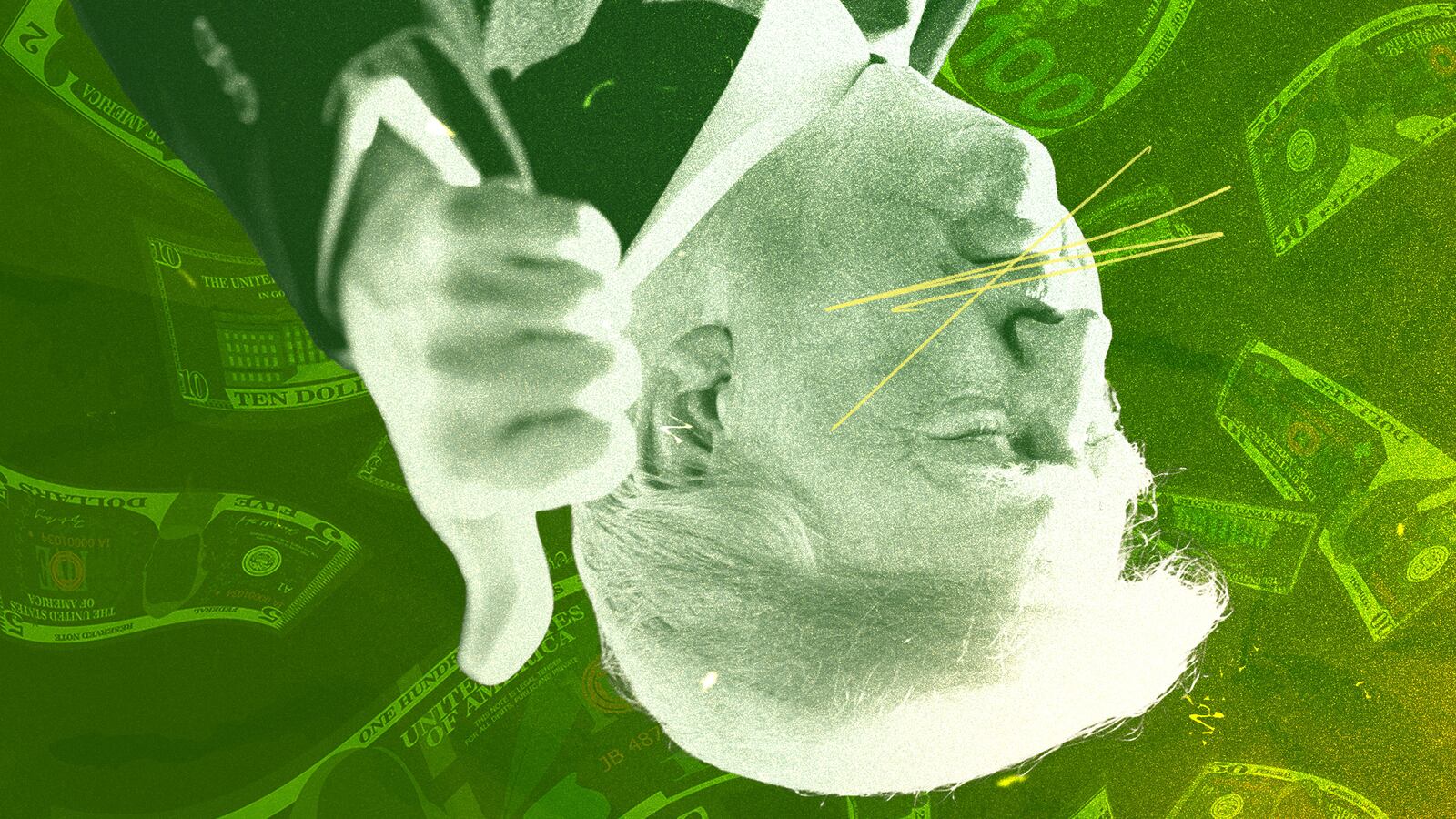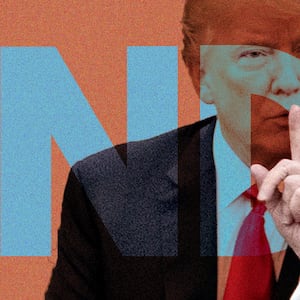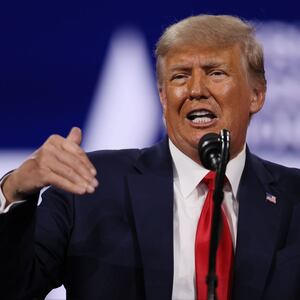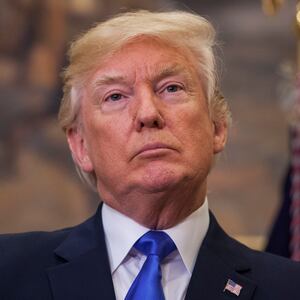Donald Trump’s notoriously belligerent non-disclosure agreements have suffered another legal blow. It’s the third such loss in the last year, and further proof of an important fact: The supposedly ironclad contracts aren’t worth the paper they’re written on.
According to documents filed earlier this month in a private New York arbitration proceeding, the Trump campaign has been ordered to pay more than $350,000 in legal costs after trying to enforce what three rulings have now established as an “unenforceable” document.
It’s the latest in a series of failed attempts to silence or penalize former aides who have crossed the former president. And in this case, Trump can chalk the loss up to his own vindictiveness.
Trump’s case targeted 2016 campaign staffer Alva Johnson, who sued him in 2019 for trying to kiss her while also alleging gender and racial pay discrimination. The lawsuit was dismissed, but Trump didn’t let it rest. Instead, the campaign sued Johnson in arbitration for allegedly violating the terms of the NDA she was required to sign.
But even though Johnson lost the initial lawsuit, the arbitrator—retired federal magistrate Victor Bianchini—agreed with two other Trump NDA decisions last year: The campaign contract was “vague and unenforceable.”
Trump, of course, has wielded NDAs with imperious delight, dating back to his days on set at his NBC reality game show. In addition to the intimidation factor, NDAs also offer certain procedural advantages, particularly for a thin-skinned litigant like Trump.
Unlike civil court, NDA arbitration cases are often private, allowing Trump to keep sensitive documents sealed and resolve disputes quietly, with little risk of embarrassment or public admission of wrongdoing. (The campaign first deployed NDAs specifically to stop media leaks, and the Trump administration’s NDA program included a slideshow threatening interns with “criminal prosecution” and a cartoon image of a jailhouse.)
But three recent judgments, including Johnson’s, have exposed fundamental flaws in the agreements, potentially exposing the former president’s secrets—secrets he’s tried to keep private, perhaps for years.
This may create more problems for Trump, because the campaign’s NDA was essentially a Xerox of the contract he foisted on Trump Organization employees and White House aides.
Jordan Libowitz, communications director for watchdog Citizens for Responsibility and Ethics in Washington, told The Daily Beast that Trump’s NDAs serve primarily to intimidate would-be whistleblowers, and that he was glad to see the campaign’s case tossed.
“In recent years, we’ve seen NDAs with overbearing non-disparagement clauses pop up on presidential campaigns. They serve mainly to silence allegations of wrongdoing. It’s a good thing that the Trump campaign’s NDA was found to be unenforceable,” Libowitz said.
“We’d hope that Trump learns a lesson from this, but learning lessons has never been something he’s excelled at,” he added, a nod to Trump’s other two known NDA losses—to former campaign staffer and White House adviser Omarosa Manigault-Newman, and former campaign aide Jessica Denson.
Those cases played a pivotal role in Johnson’s dispute, according to one of her attorneys, Hassan Zavareei, of Tycko & Zavareei LLP.
The campaign’s case hinged largely on the previous court ruling against Johnson, where a federal judge in Florida, after viewing video of the alleged kissing incident, scrapped her charge that Trump’s advances on her in an RV on the campaign trail constituted battery.
The judge, citing Johnson’s own contradictory statements about Trump, called her accusation “political,” and, while stopping short of finding her in bad faith, hinted that, given the evidence, she would be wise not to press the case further.
The campaign told the arbiter that this should land a ruling in their favor. And, according to Johnson’s lawyer, the arbiter, Bianchini, appeared open to it. Bianchini even noted the incident in his final ruling, writing that that “no reasonable person” who saw the video of the RV incident would see “anything improper,” and concluded that Johnson’s battery allegations “were false.”
But then came the Denson and Manigault-Newman victories.
“Initially, Bianchini denied our first motion to dismiss, but then Denson filed her lawsuit in the Southern District of New York, and made the same arguments that we had,” Zavareei told The Daily Beast. “So we refiled our motion, and he agreed with the judge’s reasoning in the Denson decision, changed his mind, and dismissed the campaign’s complaint.”
Bianchini handed down that decision in November, about a month after the Manigault-Newman ruling, though it was not publicly known until now. In concurring with the other cases—neither of which established binding legal precedent—Bianchini found that the confidentiality and non-disclosure terms in Johnson’s NDA were “vague and unenforceable.”
The core problem, Zavareei said, is that, essentially, “Trump gets to decide everything.”
“He gets to decide what’s embarrassing, what’s confidential, who it applies to,” Zavareei explained, noting that, according to the terms as they’re written, Trump could invoke the NDA over pretty much any perceived slight, for perpetuity.
“You can’t have an agreement that binds your speech in the future and doesn’t give you any real notice about what you can and can’t say, for something you don’t even know you’ve entered into,” he said.
Bianchini, citing the “unique history” of the case, allowed both parties to argue for damages, eventually siding with Johnson. On March 10, he ordered the campaign to pay $303,285 for Johnson’s legal costs, along with $2,950 to the American Arbitration Association and another $43,948 for his own compensation.
The Manigault arbitrator indicated in his decision that Trump had won previous arbitration settlements, though he declined to elaborate. But campaign finance filings from 2019 and 2020 indicate that the Trump campaign has lost four other cases in arbitration, for a grand total of more than $180,000 in AAA fees.
The campaign hasn’t paid up yet, Zavareei said, but they’ve set an “internal deadline.”
The notoriously stingy Trump, however, will not personally pay any of it. As with the other payouts, his donors will pick up that tab.









